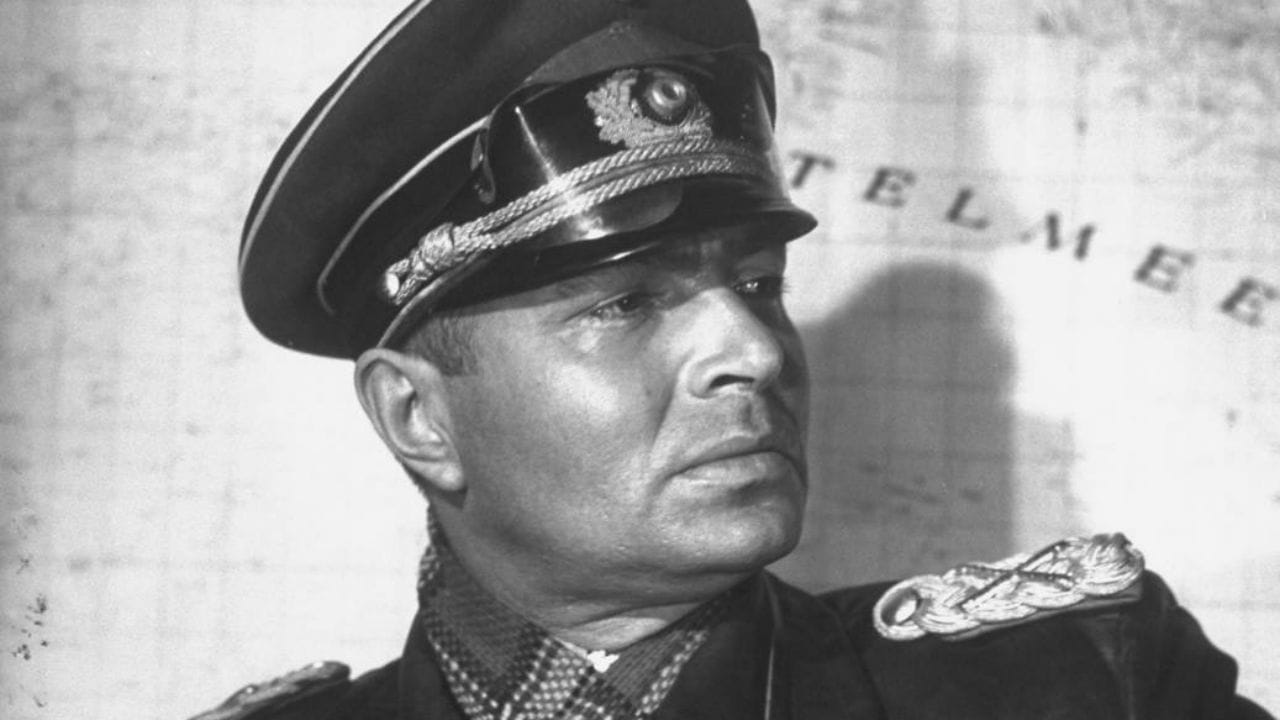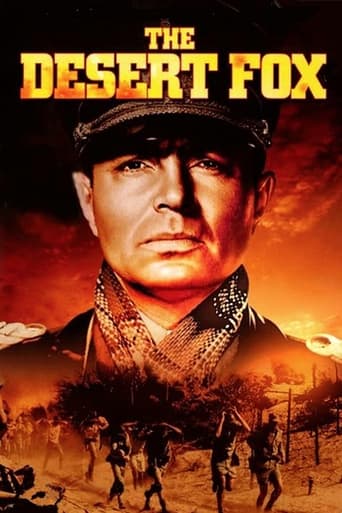

"The Desert Fox: The Story of Rommel" is an excellent film about Erwin Johannes Rommel during World War II. He was Germany's most famous military leader and one of the greatest military leaders of the war and of the 20th century. The movie is based on a book by a British brigadier, Desmond Young, "Rommel: The Desert Fox." Young was a British officer in North Africa who was captured by Rommel's forces and who saw Rommel just once. Young was so impressed with the man, especially his adherence to proper war protocol regarding treatment of POWs, that at war's end, he decided to write about him. For the next five years he researched the man, interviewed hundreds of people, and visited with Rommel's widow and son.To this day, there still is controversy over Rommel's possible role in the July 1944 plot to kill Hitler. This movie skirts the issue and shows Rommel's hesitancy to be involved in the plot. He knew several of the people who were directly involved, and some had approached him about taking a leadership role after Hitler had been overthrown. But an article in the Encyclopedia Britannica asserts that the plotters "never revealed to Rommel that they planned to assassinate Hitler." Rommel "did not accept the idea of murder for political ends." He had disregarded orders for executions that he received from Hitler. He was a favorite commander of Hitler, and on several occasions, he urged Hitler to end the war and seek peace. But he never became a member of the Nazi party.The movie shows the last three years of Rommel's life. It opens when he is in command of the German Afrika Corps. And it ends when he left his home on Oct. 14, 1944, with two generals sent by Hitler. To ensure his family's safety and provision after he was gone, Rommel agreed to take poison. Hitler's had him buried as a national hero who died from the injuries he received in the strafing pictured in the film.Rommel's last command was preparing the German coastal forces for the Allied invasion that was to come. But, it's interesting to note that contrary to most war films, Rommel did not think the invasion would be in Normandy. He agreed with the German high command and Hitler and thought that the real invasion would be at Calais. So, when the Allies landed at Normandy on June 6, 1944, he too thought it was a diversion meant to draw defenses away from Calais.James Mason does a superb job as Rommel, and all the rest of the cast are very good. This is an interesting biopic and war film.
... View MoreFor years, I avoided watching "The Desert Fox" because I assumed, like most Hollywood produced films of the era that the movie would play fast and loose with the facts. This is just too often the case with bio- pics of the era. So, I am usually much more likely to watch a documentary and get the facts instead of seeing a film which is intended much more as entertainment than a history lesson. And, given that I was a history teacher, of course I'd prefer documentaries. But in this case, I was surprised. While the film was far from perfect, what you saw was true and the filmmakers did a good job of establishing at the beginning that they conducted a lot of interviews in order to tell the story right--including consulting with Rommel's widow. I really appreciate this--and that is why I rate the film an 8. Plus the acting and most of the production were very, very nice.So, is it perfect? Nope. I had a few problems. I usually hate the overuse of stock footage and this film is no exception. In one case, I was really mad because its use was so sloppy. You see an American torpedo plane (an Avenger) become a British fighter plane in mid-air because of sloppy editing! Also, the film is NOT a comprehensive story about Rommel's life or even his life during WWII. It's much more spotty and emphasizes his progression from a loyal officer to a guy who had some knowledge of the plot to kill Hitler and kept his silence because he saw that this mad man was destroying his country. It's not a bad choice to do this sort of study but I would love to have seen more--more about him as a man.By the way, I did laugh at a scene between Rommel and von Rundstedt that would have occurred in June 1944. You see von Rundstedt putting on his scarf and picking up a heavy winter coat at the end of their talk. Where was von Rundstedt stationed...Antarctica?!
... View Morefor mistakes and atmosphere. for acting and special James Manson in Rommel skin. for images of battle, nuances of facts, naivety, desire to create a perfect picture, mixture of documentary and artistic movie, air of time and courage to create a homage - portrait. a not inspired beginning and pathetic end. but essence is adorable and the Hollywood ambitions has decent measure in this case. a memorable film about war and its personal price. shadow of monster, silhouette of chevalier, the good wife and wise friend, web of conspiracy and a man as axis of events, prey of his superior in Greek tragedy style. first virtue - courage to make a picture of a German officer after small period after war. second virtue - inspired option for Manson. last virtue - its existence. like testimony of a time sensitivity.
... View MoreRommel has always been one of those figures that has gone against the grain of "Axis Evil/Allies Good" in WWII. A solid general who acted honorably and even impressed his enemies. His involvement with the attempt to assassinate Hitler was probably more peripheral than this film made it out to be.This film tries it best to make Rommel into the elusive "Good German", the guy who knew Hitler was a jerkwad, but still tried to do his duty. The Good German was a myth. Those who turned against Hitler turned against him because Germany was losing the war. BUt it was a useful myth in 1951, when there was an attempt to turn the defeated Axis powers into valued allies. By 1951, Russia was the enemy, Germany was a friend, and a noble German to be praised was a godsend.
... View More